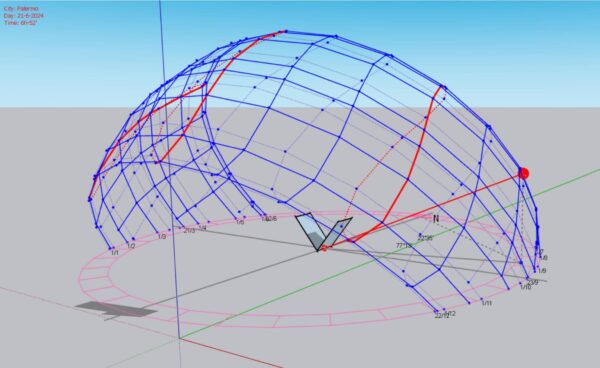Italian startup Horizonfirm srl and a group of scientists from the University of Palermo are developing a V-shaped PV array for applications in agrivoltaic projects.
The system features two bifacial modules arranged in a V-configuration with single-axis tracking, dynamically adjusting tilt angles to optimize sunlight capture while minimizing shading on crops like vineyards.
“While technically feasible with conventional monofacial panels, the V-shaped system was specifically designed to maximize the performance of high-bifaciality PV modules,” the research's corresponding author, Valerio Lo Brano, told pv magazine. “The system's unique geometry is optimized to capture both direct and reflected radiation on both sides of the panels, which is impossible with monofacial technology.”
“Using monofacial panels would significantly compromise system yield, which is fundamental to the V-configuration's value proposition,” he also explained. “The design will achieve its maximum performance potential when 100% bifaciality modules become commercially available, as this would fully leverage the system's ability to capture reflected light. The system has been dimensioned for the most common panel size currently on the market with a bifaciality factor of at least 80%, ensuring compatibility with standard bifacial modules from leading manufacturers.”
In the paper “Modeling and analysis of V-shaped bifacial PV systems for agrivoltaic applications: A Python-based approach for energy optimization,” published in Applied Energy, the researchers said that one of the major contributions of their work is the creation via the PVlib software of a custom Python-based algorithm specifically tailored to the proposed V-shaped configuration. This tool can model the system energy performance, accounting for mutual shading, multiple reflections, and ground albedo.
“It is the first-of-its-kind Python algorithm,” Lo Brano emphasized. “It also simulates multiple reflections and dynamic tilt adjustments, two features that are absent in commercial tools.”
In the proposed system configuration, PV panel slopes can have a tilt angle of 50° and 90°, with the apex line of the V-shaped cone being positioned 3 m above the ground. The modules' azimuth angle must be properly determined by the project developer, as the system cannot be used with azimuthal trackers.

Image: Horizonfirm srl, Applied Energy, CC BY 4.0
Simulations in Palermo, Italy, showed the system generates 2089.3 kWh/year per panel pair, which is 5.2% less than conventional setups but with 24% land savings. The scientists also found that the system drastically reduces land occupancy by 24%.
“When scaled to a one-hectare vineyard, the system achieved an annual energy production of 551.6 MWh, nearly double the 286.5 MWh generated by a fixed-tilt row-to-row configuration,” they added, noting that the system is adaptable to diverse agrivoltaic scenarios and crops like grapes, olives, or leafy greens that thrive under partial shade, with the system’s adjustable tilt minimizing shading during critical growth periods.
The University of Palermo and Horizonfirm are currently implementing a 949 kW pilot project with the proposed system configuration.
“The project is scheduled for grid connection by the end of the year and is being developed in partnership with Trina Solar for module supply and Huawei Technologies for smart inverters,” Horizonfirm partner and director, Christian Chiaruzzi, told pv magazine. “The Huawei systems will manage the tracking algorithm through an independent PLC controller. Additionally, we currently have three projects in progress that utilize fixed subvertical inclination structures.”
Horizonfirm has recently patented the PV system design. “The patent idea stems from the growing adoption of bifacial photovoltaic modules,” Chiaruzzi stated. “It's important to note that bifacial modules currently do not have a higher cost per kW compared to monofacial alternatives. Therefore, the increased initial investment would be exclusively related to the structural components of the V-system, including the tracking mechanism.”
This content is protected by copyright and may not be reused. If you want to cooperate with us and would like to reuse some of our content, please contact: editors@pv-magazine.com.




By submitting this form you agree to pv magazine using your data for the purposes of publishing your comment.
Your personal data will only be disclosed or otherwise transmitted to third parties for the purposes of spam filtering or if this is necessary for technical maintenance of the website. Any other transfer to third parties will not take place unless this is justified on the basis of applicable data protection regulations or if pv magazine is legally obliged to do so.
You may revoke this consent at any time with effect for the future, in which case your personal data will be deleted immediately. Otherwise, your data will be deleted if pv magazine has processed your request or the purpose of data storage is fulfilled.
Further information on data privacy can be found in our Data Protection Policy.